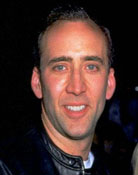IN an industry in which everyone longs to be tagged a brooding, edgy rebel, Nicolas Cage is the genuine article. During the course of his movie career, Cage has had two teeth yanked out sans Novocain (while filming Birdy, 1984), has trashed his trailer in a fit of spleen (The Cotton Club, 1984), and has eaten a live cockroach on camera (Vampire's Kiss, 1989). Now there's a guy who will do anything for art. Born Nicholas Coppola in suburban Los Angeles to dancer-choreographer Joy Vogelsang and comparative literature professor August Coppola, much of his childhood was marred by his mother's severe depression? an illness that kept her hospitalized for years (she has since recovered). The future actor and his two older brothers were, for the most part, raised by their father, who instilled in his sons an appreciation for great works of art, literature, and cinema. Summers usually included a lengthy vacation in San Francisco, where the Coppolas would visit Dad's brother, director Francis Ford Coppola. At age fifteen, Nicholas, who had devoted many childhood hours to staging scenes from comic books and television shows, devoted one such family holiday to attending a summer-long acting class at San Francisco's American Conservatory Theater.
Back in L.A., Nicholas led a decidedly more middle-class existence than either his wealthy Bay Area relatives or his fellow students at Beverly Hills High School. He hated school and opted to take the G.E.D. exam in eleventh grade. After getting his certificate, Nicholas landed a part as a surfer dude on a short-lived TV series called The Best of Times (1980-81), and made his feature film debut in a small role in Fast Times at Ridgemont High (1982). Determined not to coast to success on his uncle's coattails, Nicholas Coppola changed his name to Nicolas Cage, after a comic- book character named Luke Cage. Still, he was not averse to accepting work in his uncle's troubled- teen flick Rumble Fish (1983). That same year, Cage achieved his first glimmerings of stardom for his hangdog leading- man performance in Valley Girl.
Cage again stepped in front of his uncle's cameras to star opposite Kathleen Turner in Peggy Sue Got Married (1986). Because he then made a point of varying his voice and appearance from film to film, Cage delivered an overly experimental performance that elicited terrible reviews from co-stars, studio executives, and critics alike. His lambasted piece of work did, however, benefit his career in two important ways: it mercifully guaranteed that he would never again make another teen movie; and it piqued the interest of both Cher and the moviemaking Coen brothers. Cher lobbied to have Cage cast as her love interest in 1987's Moonstruck, and the Coens sought out Cage for his first adult comedy, Raising Arizona, that same year. Both movies helped cement Cage's reputation as a quirky yet charming everyman, and those roles yielded similarly off-kilter assignments in Vampire's Kiss (1990) and Honeymoon in Vegas (1992).
By 1994, Cage had established a healthy, if not entirely fulfilling, movie career. He commanded roughly $4 million per picture and had his pick of a steady flow of decent scripts. When director Mike Figgis asked him to appear in 1995's Leaving Las Vegas, a low-budget, independent picture about a suicidal alcoholic, Cage found something he could throw his heart into. He signed on to play the doomed protagonist for the relatively paltry sum of $240,000, but the role paid off in other ways: Cage earned the most laudatory reviews of his career and a Best Actor Oscar to boot. He next delved into the action genre, playing an FBI chemical warfare expert in The Rock; a heroic ex-con in the hijacking- themed Con Air; and a sadistic criminal mastermind in the John Woo thriller Face/Off, in which he co-starred with John Travolta. In 1998, Cage played a celestial being who romances Meg Ryan in City of Angels, a weepie inspired by the Wim Wenders classic Wings of Desire. He next returned to the lucrative action-hero arena for Snake Eyes, which co- starred Gary Sinise. In 1999, he turned to producing with the indie film Shadow of the Vampire, about the making of the silent horror film Nosferatu, and joined the $20 million actor's club for his role in Gone in 60 Seconds, out in 2000.
Off-screen, Cage has always played the role of movie star to the hilt. He currently divides his time between an ever- growing number of over-the-top abodes, including a downtown L.A. penthouse apartment; a 1940s country English style abode, also in L.A.; a Victorian mansion in San Francisco; and a faux- German castle in the Hollywood Hills, decorated in an eclectic style he terms 'hot-rod Gothic.' He boasts a swank wardrobe and an equally swank fleet of European sports cars. A dedicated actor, Cage spends considerable time preparing for his roles, gleaning as much information as he can about each character's world. He also manages to work out twice a day, write poems and stories, and juggle a busy social schedule. He married actress Patricia Arquette, whom he had dated briefly eight years earlier, in April 1995 after a lightning-fast courtship. Both Arquette and Cage come from show-business families and each has a son from a previous relationship. The couple starred together for the first time in Martin Scorsese's 1999 film Bringing Out the Dead. Cage filed for divorce, citing the usual 'irreconcilable differences,' four months after the film's release.



